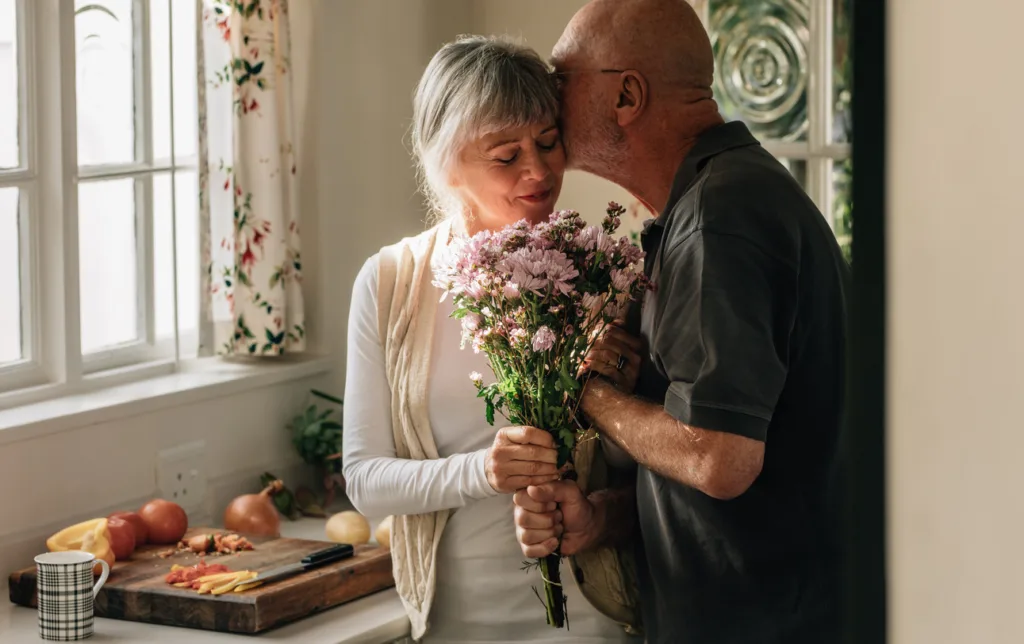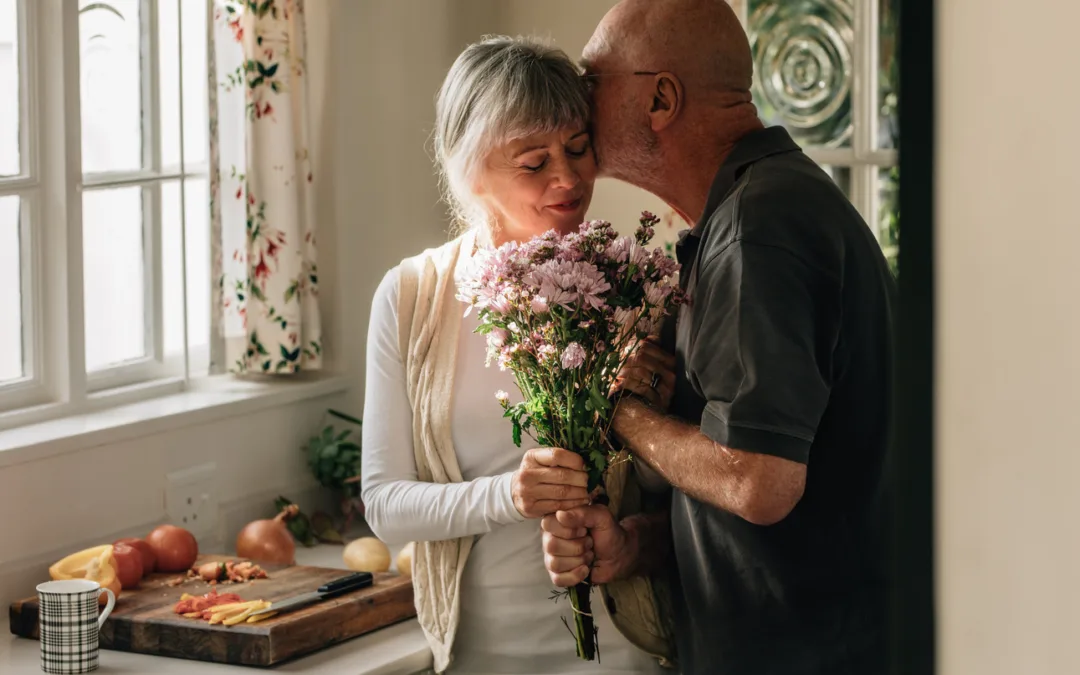
How love can affect your income
Frank Sinatra sang that ‘Love and Marriage’ went together like a ‘horse and carriage’ back in 1955. But that was a lifetime ago, and relationships and money are now viewed entirely differently. Marriage is far less frequent, with many people happily partnering instead. And there were virtually no divorces back in 1950s, compared to the dramatic upsurge in the 1970s when no-fault divorce was introduced.
Society is now generally very tolerant of almost any type of living arrangement.
But when it comes to money, your relationship status can still matter a lot.
You might wonder why. Whose business is it anyway? And that’s a fair question. In retirement, the answer depends upon your source of income. There’s about a 70/30 split when it comes to retirees receiving government benefits or those who are self-funded. So that’s the first classification that indicates how much your relationship could affect your income.
Let’s start with those who are self-funded, i.e. they do not qualify for an Age Pension at this stage. As they are not applying for government income support, their relationship status is not relevant. But most self-funded retirees are now eligible for a Commonwealth Seniors Health Card (CSHC) since the increase in income thresholds in November 2022. These cards provide valuable health, transport and energy discounts so are well worth the application. And since the November change in thresholds, Centrelink has made it even easier for self-funded couples to apply just once, in a couples’ application. So for this purpose, your relationship status will be relevant.
There is also the very real matter of estate planning. Regardless of whether you are likely to receive an Age Pension or will be self-funded until the day you die, the way you organise your affairs is extremely important for the welfare of those around you. Many people will opt to fill in a low-cost will purchased at the local newsagent. And that may be fine for those who have little in the way of assets. But if your assets include property, superannuation, shares, managed funds, annuities and more, it is important to seek professional legal advice about the way you would like your estate divided. Not doing so could severely damage the financial interests of your partner, your children, your siblings and others you care about.
What about Centrelink?
If you hope to receive an Age Pension, Centrelink’s assessment of your relationship status can influence three important aspects of your benefits; if you get a payment, the type of payment and the amount.
This is because the thresholds for the means test (both income and assets) are different for singles and couples.
So your payment will depend upon whether you are viewed as a couple or single. And this is where it can get tricky.
Generally, you will be defined as a couple if you are married, in a registered relationship or in a de facto relationship.
If you separate, you need to have to separated both physically and emotionally. Our Customer Services Team leader, Steven, mentioned the other day that he had worked with a lady who was hoping to receive a single Age Pension. But she was still living with her ex-husband, joining him for social events – and they hadn’t yet told the family that they were no longer a couple. To all intents and purposes, including Centrelink, they are still a couple. So the decision to proceed with a single or couples pension application needed a rethink.
And then there are other family relationships. If you live with a sibling, parent or adult child, that’s fine according to the rules of the Age Pension. It is romantic relationships which are deemed to make you a couple.
There are various ways and means of communicating changed living arrangements to Centrelink, including a ‘separated under one roof’ declaration (required from each person). Such ‘ex-couples’ will also need to have their situation regularly reviewed by Centrelink to ensure the correct amount is being paid. Singles in share housing may also need to submit a ‘relationship details form’.
Further changes in relationship must also be reported. Failure to do so can attract fines and the need to pay back any over payments because of inaccurate original reporting. This includes people who partner – they are no longer two singles, but now a couple according to the Centrelink.
The main rule
The most important consideration, for those on entitlements, is to keep Centrelink fully informed of your relationship status. And if you are in any doubt, to check. Don’t just accept income without verifying that you are being paid the amount appropriate for your situation.
How do you find these rules?
Do you believe it should matter so much whether those on an Age Pension are single or couples?
Or should we simply strike one rate for all individuals and pay pension entitlements accordingly?






Australia taxes individuals equally based on their income, regardless of their marital/ relationship status. Therefore, Age Pension should be paid to individual taxpayers equally, regardless of their relationship status and stop discriminating aged people in relationships. Many relationships breakdown due to financial pressures and that is very undesirable outcome for frail and/ or elderly who need partners’ support.
There should not be any restriction whatsoever about pension entitlement. The only criterion should be whether one has paid taxes for more than say 5 years and whether one has supported a tax payer as part of life. This means that even a multimillionaire should be entitled to the pension.
Others who may not have paid tax should be government supported through other umbrellas like disability pension, or a pension that may be called survival pension.
This will sustain or increase discretionary spending which will be good for the economy.
We are all individuals so should not be penalised for being a couple. Why not a universal type super
Are you telling me that the government penalises heterosexual people for having sex? And all married couples ? What is the basis for giving people in relationships $13,000 less a year? They both eat the same, both have cars and phones and insurance and many live in separate houses so have the same household bills? In fact last censorship showed us a majority of single dwellers… if there was one universal payment for all you might find a solution to the housing crisis across the country. A lesser couple rate is outdated, not in touch with modern living and penalises those with beach shacks, two cars , . There is no discount couple thing on health insurance, tickets, cruises, air fares so why discriminate ? Seems to be a penalty for having sex . Many seniors have rejected second marriages because of this ruling and live singly in four bedroom houses .
Yes we need to change the rules so that each person in a ‘couple’ get much closer to the same amount singles get.
Decades ago when these rules were made the whole family often sat around watching tv together, sitting under the same light. The same food was cooked and eaten together and just the one car was needed for the man to go to work. A Birthday gift or Wedding gift was given as a couple.
Much has changed since those days with gifts often being from each individual. Each person in the couple has their own electronic devices for entertainment now as well as their own car.
Couples are more likely to work at different times of the day than years ago using power at different times to each other.
Some things like Council Rates and house Insurance are still an advantage for a couple but I do think overall their is less benefit than once upon a time.
how does it work when 1 partner is significantly older than the other. ( ie 20years).
is it true that if I retired and my partner was still working then I would not be able to receive a pension?
Hi Steve, great name! Having a younger partner does not automatically disqualify you from receiving the Age Pension however their income and assets (except super in accumulation phase) will be assessed to determine your eligibility. Often the reason why having a younger partner rules people out of the Age Pension is because the partner is still working full-time so their salary (when combined with deemed income from each of your financial assets) exceeds the threshold.
Everything should be treated as an individual. We all paid the same taxes for our entire working life. And many of us now retiring did not get maternity leave and other benefits granted to everyone today.
hi,all seniors should receive the pension card,however a sliding scale should apply to assests.I have worked hard my hole life and due to this assest test I get nothing.
As reflected in these contributions, much has changed since the couples/singles arrangement for Pensions & benefits was established.
Literally billions of $ in monitoring a ‘couples’ measurement are wasted. The administrative workload keeps thousands of public servents in jobs, but no government wants to shoulder the change risk.
For example, the Seniors Health Care Card: It should be a right on attaining pension age that ALL citizens are entitled to such card.
Instead, the complicated formula, based on a theoretical ‘adjusted’ Income (mainly deemed – i.e. guessed income!) for citizens who have paid tax for years and notification of changes (& therefore regular reviews) is anti-incentive to save for retirement & be prudent.
Hoow much more sensible that on reaching 67/70 (or whenever set) produce your proof of citizenship/passport you get the card for LIFE. Public servant costs savings – tens of thousands! No need for reviews until cancellation on death!
Absolutely! In NZ everyone gets the pension at 65. No discrimination over income or assets. A huge saving in administration. They do have single and couples rates though which is to allow for rent, rates, house maintenance, house and contents insurance being the same for one as for two. Abolishing this would save greatly in administration costs.
my partner and I have a legal financial agreement drawn up by a solicitor. we are financially independent of each other. I have just retired after 36.5 years in the one workplace. my partner works part-time as due to my assets he cannot access a pension even though he has health issues which prevents him working full time. This is not fair
When calculating eligibility for the pension cash and assets are calculated separately. Also some things like the family home are exempt. Can you list for us what is included in the calculations of each, and what is exempt please
Hi Grace, thank you for reaching out! Technically we could list everything out as you have asked but it would be quite an exhaustive list and you’d likely find many things irrelevant to you or potentially confusing. Instead we prefer to offer a more tailored/personalised solution via a one on one consultation with our specialists. This enables us to explain only the things you need to know without any noise or distractions. To learn more about how you will be assessed, please CLICK HERE and make a booking.
A lot of older people are in relationships but their finances are kept totally separate. For example, if there is a widow or widower and their assets will eventually go to their children, I do not think it is fair that the government should assume couples share finances. Even in some marriages, finances are kept separate.
If someone in this instance applies for the pension, it should only be their finances which are taken into account.
What classes you as a couple?
The above comments are all valid. My question is the basic underlying one. How is discriminating against couples with regards to age pension payments not illegal under general anti-discrimination laws?
Also why is a couple expected to live on $13,000 less per year than say two siblings living in the same house? Two people have the same living costs regardless of whether they are a couple or not. Couples are literally penalised just for being a couple even though they have paid single taxes all their life!